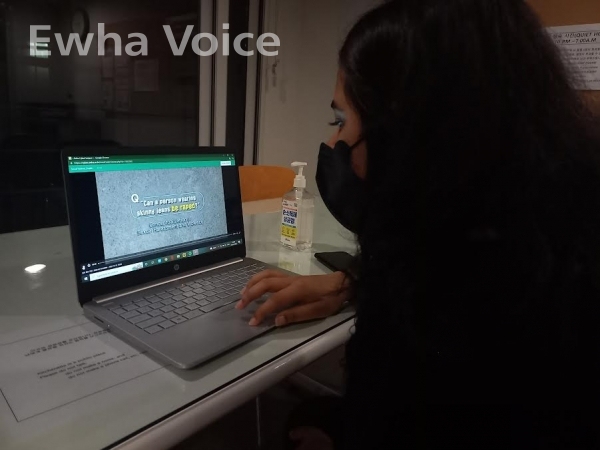
As soon as the spring semester ended, hundreds of class reviews based on student feedback were updated to the online school community, Everytime. In particular, the quality of English classes was one of the frequently debated topics among students. While some are satisfied with high-quality English classes, many students called for improvement as they experienced a number of incoherent lectures and lack of assistance for those who have difficulty following the class materials.
A student who wished to remain anonymous expressed her frustration over the quality of English classes. She said that she had to drop one of her classes because the professor was so inarticulate during the lecture that it was difficult to follow.
“Although the class material was not difficult itself, I could not keep up with the class because it was hard to understand what the professor was saying,” she said. “My friends who lived in English-speaking countries agreed with me as well.”
On the other hand, Kim Seo-yeon, a freshman from the Department of Economics, expressed her satisfaction with the English classes provided at Ewha. English classes gave her the opportunity to enhance her reading comprehension skills and refine her writing abilities. She believes that it would help students boost their English skills if more elective courses were offered in English.
Similarly, Tan Wei Jing, a freshman from the Division of English Language & Literature, shared that she has been extremely satisfied with the English classes she had taken so far in the semester. Most lectures were given in a way that was perfectly understandable.
However, Jing acknowledged that many of her classmates have complained that the syllabus for some English classes are rather rigid. She believed that it is important that professors take into consideration of the students’ feedback and teach in a more flexible manner.
According to the Office of Academic Affairs, English classes at Ewha were newly established for exchange students in the 1970s along with the start of Ewha International Summer College. Since 2007, they have become part of the compulsory courses required for graduation, which aims to strengthen students’ global competence.
As of 2022 academic year at Ewha, 15 credits of English classes are required in the College of Liberal Arts, Social Sciences, Natural Sciences, Business Administration, Nursing, and Division of AI Convergence, 12 credits in College of Education, and 9 credits in the College of Music, Art & Design, Medicine, and Pharmacy. Particularly, in the case of the College of Liberal Arts, the currently required credits for English classes are 15, but it was once increased from 12 in 2007 to 18 in 2014.
Compared to other nearby schools, Ewha requires a similar or greater number of English classes. It is similar to Sogang University and Korea University where students have to take at least five classes in English before graduation. On the other hand, given that Yonsei University requires only two English classes and Dongguk University four classes, the level of Ewha’s requirement seems far greater. Hongik University has been known to have not implemented the compulsory system.
The provision and obligation of English classes at universities were started not only to provide convenience for international students but also to help their undergraduates get used to using English and thus improve their global communication skills, following the social and world trend of internationalization.
The evaluation of university rankings made by press companies has also ignited universities’ expansion and strengthening of English classes, deviating from its initial purpose. Korean media outlets, such as JoongAng Ilbo, annually report the evaluation results of universities nationwide, which includes the ratio of English classes in the evaluation criteria. With that in mind, more universities are expanding the number of English classes.
Some students agreed that it is necessary to open English classes in order for Ewha to become a globally competitive university. Students who wished to remain anonymous shared that English classes have assisted in developing their English speaking skills in discussion sessions. However, some students have argued that it is unnecessary to have these English classes compulsory.
“While the quality of the English classes I have taken so far has been good, I do not like how English classes are part of our graduation requirements,” a student who wished to remain anonymous said.
She elaborated that English classes did not particularly improve her overall skills in the language. It is inevitable that some lectures are incoherent as not all professors are native English speakers. To keep the quality of English classes high, she believed that there should be more fluent professors and English class requirements should be reduced.
As English classes are attended by various students with different levels from students who feel awkward or difficult to use English to international students and those who are fluent at the native level, there are many areas to consider when offering them. The time arrived for the university to come up with ways to boost the effectiveness of English classes and satisfy students.

